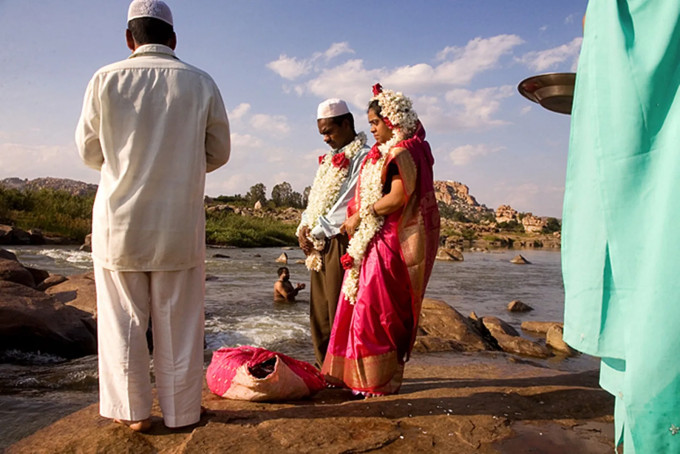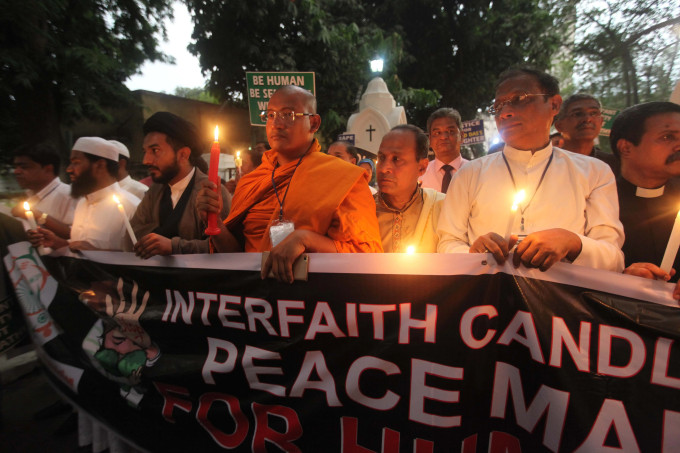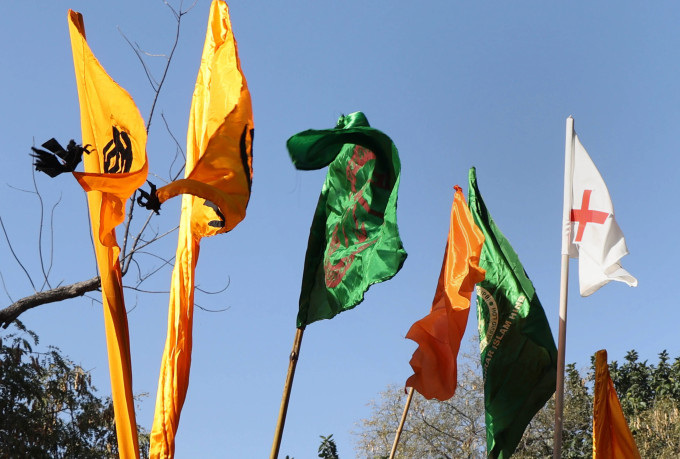Navigating interfaith relationships: 6 couples share their stories
She was on a trip to Rajasthan with her daughter and relatives; he was their tempo traveller’s driver. They got to know each other but did not keep in touch. A year later, they reconnected on a work trip, and she discovered he was the owner of the travel company. “The driver had canceled at the last minute. How could I leave you guys in the lurch?” he said to her. She was impressed. After all, where are the honest, upstanding men anymore? Cut to the present, Mr and Mrs Singh are now happily married.
This heartening meet-cute, reminiscent of the Deepika Padukone-Irrfan Khan movie Piku, ended in a happily ever after, but it wasn’t all smooth sailing. He was a 34-year-old Sikh from Punjab, and she was a 42-year-old divorced ‘Bangalan’ with a teenage daughter. Their age gap and different faiths posed challenges, especially with his family, she tells me.

Their story reflects a growing trend of interfaith relationships, like Parsi-Christian couples such as the Zaiwallas, Hindu-Sikh couples like the Singhs, Hindu-Muslim couples like Divya and Kashif, and Bollywood stars like Sonakshi Sinha and Zaheer Iqbal. We spoke to five couples about navigating their interfaith relationships, right from dealing with their relatives to reaching a compromise with each other, and even bringing up kids together.
View this post on Instagram
A post shared by Sonakshi Sinha (@aslisona)
Sara Hussain and Julian Manning
Sara Hussain and Julian Manning, once colleagues who couldn’t stand each other, now share an ‘enemies to lovers’ story. “He was so annoying,” says Sara. Together for eight years now, they say they had it a “little easier” since neither actively practices their religions—Islam and Christianity.
Julian, partly (Bengali) Hindu from his mother’s side, was raised Christian by his American father in Texas. “There is a side of his family that is traditional but I haven’t interacted with them yet. I’m going to celebrate Christmas with his extended family this year,” Sara says.
What has now become a running joke between the couple was surprising first when Sara’s traditional, religious uncle told them to get married. “He’s godless, you’re godless. What’s the problem?” he had asked. Both sets of parents have been very supportive, preventing relatives from criticising their interfaith relationship.
Julian confesses being in this relationship has opened up his life to cultural exchange of a different kind, and appreciates having “more holidays to celebrate”.
View this post on Instagram
A post shared by Religious Unity In Memes (@interfaithmemes)
Divya Ratan and Kashif Sangam
Divya Ratan and Kashif Sangam, like Sinha and Iqbal, had a registered marriage. They are celebrating their 10th wedding anniversary this year, after being together for a decade more.
“Neither of us wanted to convert, and I’m thankful our families supported our decision,” says Divya. They set a ground rule: no religion ever comes into the picture. “If I wanted to marry a Hindu, I would’ve married one. I wanted to marry him. Religion wasn’t a part of it,’ she tells me.
The couple adhered to this rule, celebrating all festivals with both families. They had to make a compromise with their ground rule when enrolling their two sons in school. The couple had given the boys last names that can’t identify their religion. “Schools were insistent on disclosing the kids’ religion or surname,” Divya says.
Due to Tamil Brahman traditions, she couldn’t use her surname, which is her father’s name, so they eventually used her husband’s surname. The school insisted on this saying it is required for the “Census”. ‘We knew the reason didn’t hold up, but we had no other option,’ Divya says.
 To this day, Joji’s side of the family doesn’t know the couple had two weddings — one Christian for Joji’s family and the other in the Hindu Maharashtrian style for Sugandha’s. (Source: Wikimedia Commons)
To this day, Joji’s side of the family doesn’t know the couple had two weddings — one Christian for Joji’s family and the other in the Hindu Maharashtrian style for Sugandha’s. (Source: Wikimedia Commons)
Sugandha and Joji John
Sugandha and Joji John have been married for 31 years, having met in college when Joji was 18 and Sugandha 20.
“Interfaith marriages were rare in our time,” says Joji. “I came from a Malayali Catholic household, and she from a traditional Maharashtrian one. But being raised in Mumbai, we were familiar with each other’s cultures.” Their parents knew each other, easing the process, but dealing with relatives was a different ballgame. To this day, Joji’s family doesn’t know the couple had two weddings: a Christian ceremony and a Hindu Maharashtrian one.
“My dad’s relatives have no idea about the Hindu wedding because they only wanted a Christian one,” their daughter Nikita, 27, shared. To respect both religions, Joji and Sugandha had both ceremonies.
Joji and Sugandha, both religious, have raised their children to celebrate both faiths, allowing them to choose their own paths. “Sugandha does her pooja every day, we do Lakshmi pooja (Diwali), and we celebrate Christmas and Easter. It’s important to meet halfway and respect each other’s religion,’ Joji explains.
They believe their interfaith marriage has helped them appreciate differences and similarities, fostering tolerance and understanding —qualities the world needs.
 “When we have more people marrying into each other’s faiths there’s lesser room for those in power to create divides or instil fear in the name of caste or religion.” (Express archive photo)
“When we have more people marrying into each other’s faiths there’s lesser room for those in power to create divides or instil fear in the name of caste or religion.” (Express archive photo)
Rosary Tuolor
Rosary Tuolor met her now ex-boyfriend at 19. “I am a practicing Christian, and he is a Jain. But it didn’t matter to us at the time.”
They recently broke up after almost six years of dating. “The more we thought of the future, the more difficult it looked,” she says. Rosary reveals the reason was their religious and cultural differences.
“When you’re just dating you don’t realise the smaller things but once we went on a trip, some of the problems became so glaringly obvious. From keeping vegetarian and non-vegetarian food in the fridge together to will you go to a mandir or do this pooja with me, it was a lot,” the now-25-year-old says.
Mr and Mrs Zaiwalla
The Zaiwallas have been together for 11 years, seven of which they’ve been married. “My husband is a Parsi and theirs is a small community where members lose rights when they inter-marry. So, that was a major concern for my husband’s family. In my case, the concern was that I wouldn’t pass down my religion to future kids, nor could I have a church wedding as that was a strict no-no for my husband’s family. So, we ended up having a civil wedding,” Mrs Zaiwalla says.
Both families faced pressure from their communities, with people trying to ‘brainwash’ them against each other. Mrs Zaiwalla gave the example of her “in-laws’ friends, who warned them about me getting my husband converted into my religion by putting something in his food. I was told to beware of the “crazy” people who marry their sisters and brothers!” she tells me.
Despite these challenges, the couple remains peaceful, partly because neither actively practices their faiths.
 Flags of different religions during an interfaith harmony walk (Express archive photo)
Flags of different religions during an interfaith harmony walk (Express archive photo)
However, conflicts arise during events involving extended family, like her baby shower, where differences in rituals caused discomfort. “My mom was expected to be part of some Parsi rituals, which she wasn’t comfortable with. Similarly, my husband’s family didn’t seem comfortable participating in the Catholic traditions,” she says. Mrs Zaiwalla feels “fortunate” that religion hasn’t been an issue in their partnership but acknowledges that might change. They have agreed to be supportive if one becomes more religious in the future, without imposing beliefs on each other or their son.
Growing up, Mrs Zaiwalla reveals she “felt like an outsider” due to her minority religion, but her marriage has changed that perspective. “When more people marry into each other’s faiths, there’s less room for division and fear based on caste or religion. Greater exposure and acceptance lead to a more inclusive society. That’s secularism in its truest form,” she says.
📣 For more lifestyle news, click here to join our WhatsApp Channel and also follow us on Instagram
Disclaimer: The copyright of this article belongs to the original author. Reposting this article is solely for the purpose of information dissemination and does not constitute any investment advice. If there is any infringement, please contact us immediately. We will make corrections or deletions as necessary. Thank you.

